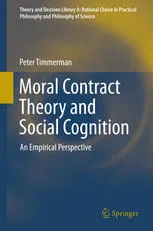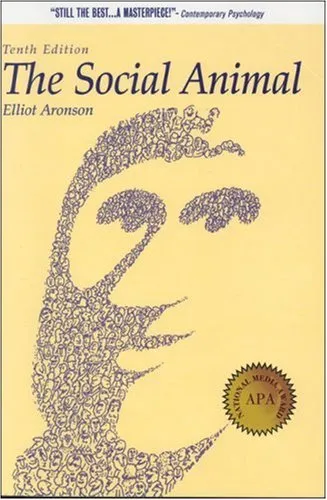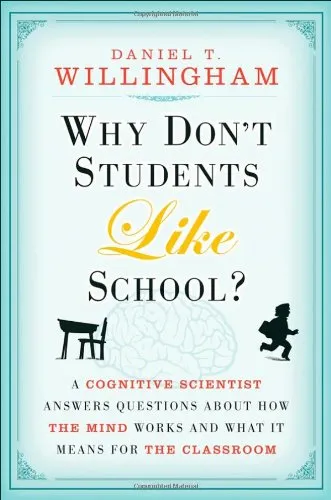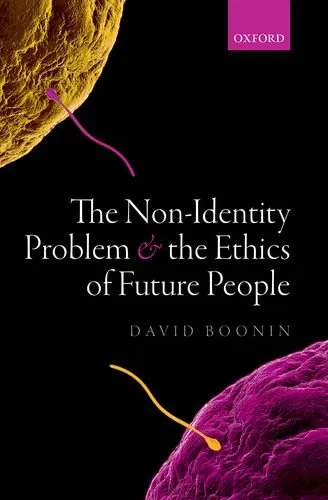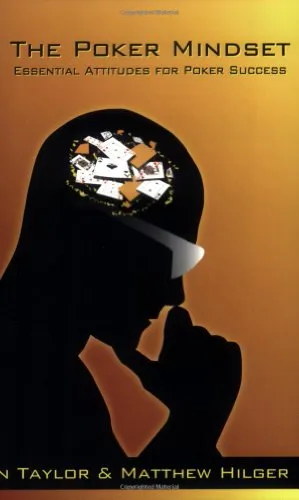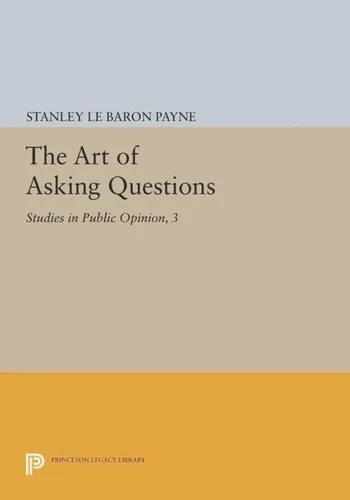Moral Contract Theory and Social Cognition: An Empirical Perspective
3.5
بر اساس نظر کاربران

شما میتونید سوالاتتون در باره کتاب رو از هوش مصنوعیش بعد از ورود بپرسید
هر دانلود یا پرسش از هوش مصنوعی 2 امتیاز لازم دارد، برای بدست آوردن امتیاز رایگان، به صفحه ی راهنمای امتیازات سر بزنید و یک سری کار ارزشمند انجام بدینکتاب های مرتبط:
معرفی کتاب
کتاب "Moral Contract Theory and Social Cognition: An Empirical Perspective" اثری است که به بررسی رابطه میان نظریه قرارداد اجتماعی و شناخت اجتماعی از یک منظر تجربی میپردازد. این کتاب تلفیقی از فلسفه اخلاقی و روانشناسی شناختی است و نویسنده، پیتر تیممرمن، تلاش کرده تا با آوردن شواهد تجربی روشن، بحث پیچیده و گاهی انتزاعی نظریه قرارداد اخلاقی را به سطح عینیتری وارد کند.
در این کتاب، مفهوم قرارداد اخلاقی نه فقط یک ساخت انتزاعی بلکه به عنوان ابزاری برای فهم رفتارها و تصمیمگیریهای اجتماعی مورد تحلیل قرار میگیرد. نویسنده معتقد است که شناخت اجتماعی، نقش کلیدی در شکلگیری قراردادهای اخلاقی ایفا میکند و این ارتباط در طول کتاب با استناد به تحقیقات تجربی، شواهد تاریخی و بررسیهای انسانشناسی توضیح داده میشود.
خلاصهای از کتاب
این کتاب در چندین فصل سازماندهی شده که هر کدام به نحوی با نگاهی خاص به موضوع قرارداد اخلاقی و ارتباط آن با فرآیندهای شناخت اجتماعی میپردازند. در فصل اول، نویسنده به معرفی بنیادهای نظری Moral Contract Theory میپردازد و توضیحاتی درباره خاستگاههای این نظریه ارائه میدهد. فصلهای بعدی به بررسی چگونگی تأثیر فرآیندهای شناختی، مانند تفکر استنتاجی و همدلی، بر رفتارهای اخلاقی پرداخته و با شواهد و آزمونهای روانشناختی معتبر این ارتباط را تحلیل میکنند.
در بخش میانی کتاب، به نقدهایی که معمولاً به این نظریه وارد است، پرداخته میشود و نویسنده تلاش میکند تا با بهرهگیری از دادههای تجربی جدید، این نقدها را پاسخ داده یا راهحلهایی را پیشنهاد کند. در نهایت، کتاب با بررسی بُعد عملی قراردادهای اخلاقی در جوامع مدرن به پایان میرسد؛ جایی که مسائل اخلاقی روزمره مانند توزیع منابع، عدالت اجتماعی و نقش رسانهها در شکلگیری هنجارهای اجتماعی تحلیل شده است.
نکات کلیدی کتاب
- ارتباط میان Moral Contract Theory و علوم تجربی مانند روانشناسی شناختی نشان داده شده است.
- اهمیت شناخت اجتماعی در تنظیم قراردادهای اخلاقی برای حل مسائل بینفردی و اجتماعی بررسی شده است.
- این کتاب به خوانندگان کمک میکند تا تعاریف انتزاعی اخلاقی را به جهان واقعی و موقعیتهای عملی ربط دهند.
- نقدهای رایج بر نظریه قرارداد اخلاقی همراه با پاسخهای پیشنهادی مبتنی بر دادههای تجربی ارائه شدهاند.
- تأثیر فناوری و رسانههای جدید بر قراردادهای اخلاقی و شناخت اجتماعی تحلیل شده است.
نقلقولهای مشهور از کتاب
"اخلاق، چیزی بیش از قرارداد نیست، اما این چیزی است که ما به طور مشترک ایجاد میکنیم تا بیثباتی ناشی از خودخواهی انسانی را برطرف کنیم."
"شناخت اجتماعی، ریشه هر نوع قرارداد است؛ بدون درک دیگری، هیچ توافق واقعی امکانپذیر نیست."
"قراردادهای اخلاقی زمانی معنا مییابند که ما توانایی همدلی و درک متقابل را داشته باشیم؛ اینجاست که ذهن و اخلاق به هم پیوند میخورند."
چرا این کتاب مهم است
این کتاب برای کسانی که به دنبال درک عمیقتر از رفتارهای اخلاقی و سازوکارهای ذهنی پشت این رفتارها هستند، اهمیت ویژهای دارد. ترکیب فلسفه و روانشناسی شناختی نادر است و این اثر با نگاهی مدرن و علمی، حفرههایی را پر میکند که بسیاری از آثار پیشین از آن غافل بودهاند. به خصوص، برای دانشجویان و پژوهشگران در زمینههای علوم شناختی، فلسفه اخلاق، و علوم اجتماعی، این کتاب میتواند به عنوان یک منبع مرجع و الهامبخش استفاده شود.
علاوه بر جنبه علمی، کتاب از لحاظ عملی نیز حائز اهمیت است. مسائل اخلاقی و اجتماعی در دنیای مدرن پیچیدهتر از همیشه شدهاند و این کتاب ابزارهای سودمندی برای تحلیل و حل این مسائل فراهم میکند. نویسنده تاکید دارد که بدون شناخت فرایندهای ذهنی، نمیتوان به فهم درستی از اخلاق در سطح فردی یا جمعی رسید.
Introduction
Welcome to an exploration of one of the most compelling intersections of philosophy, psychology, and social science. "Moral Contract Theory and Social Cognition: An Empirical Perspective" is a book that seeks to bridge the ancient philosophical underpinnings of moral contract theory with modern advancements in social cognition research. In a world that increasingly grapples with questions of ethics, cooperation, and collective decision-making, this book offers a groundbreaking perspective by bringing empirical data into direct dialogue with theory.
Written with a multidisciplinary audience in mind, this book appeals to philosophers, psychologists, social scientists, and any reader interested in understanding the basis of human cooperation and moral reasoning. Through its pages, the framework of moral contract theory is not only reexamined but rather contemporized, offering fresh perspectives supported by cognitive and empirical science. It provides a nuanced lens to comprehend why we make moral decisions and how trust, reciprocity, and cooperation influence both individuals and societies at large.
Summary of the Book
At its core, "Moral Contract Theory and Social Cognition: An Empirical Perspective" examines the philosophical concept of the moral contract—a conceptual agreement individuals adhere to for mutual benefit—and places it under the microscope of modern social cognition. The book traces the intellectual lineage of contractarian ethics, diving into the works of foundational thinkers like Hobbes, Locke, Kant, and Rawls, while also addressing critiques of the theory.
What sets this book apart, however, is the incorporation of empirical studies from the cognitive and social sciences. How do our brains intuitively process concepts like fairness, trust, and moral responsibility? How do our innate cognitive mechanisms interact with socially constructed norms? By answering these questions, the book bridges the gap between theoretical philosophy and practical, observable human behavior.
Delving into various topics—such as moral heuristics, the role of emotions in moral judgment, and cultural variations in moral frameworks—the book paints a rich picture of how and why human practices of moral agreement evolve. From exploring game theory experiments to neuroscientific research on empathy and reciprocity, every chapter builds toward a comprehensive understanding of moral cognition in the context of contractual obligations.
Key Takeaways
- Moral contract theory, while rooted in philosophy, has practical implications when viewed through the lens of modern cognitive science.
- Concepts like fairness and trust are not merely abstract ideas but are supported by biological and neurological evidence.
- Empirical research enriches our understanding of long-standing debates about human nature and morality, providing new tools for resolving ethical dilemmas.
- Cultural and individual variability challenge the universality of moral contract theory, but they also broaden its applications in a diverse world.
- Understanding moral cognition has implications beyond morality; it provides insights into social cooperation, conflict resolution, and institutional trust.
Famous Quotes from the Book
"A moral contract is not just a product of reason but also of emotion, shaped as much by our capacity to empathize as our ability to calculate mutual benefit."
"The line between self-interest and collective good is where the moral contract thrives—and where it is most often tested."
Why This Book Matters
This book is not merely an academic exploration but a timely contribution to ongoing conversations about morality and cooperation in a fragmented world. As humanity confronts global challenges—from climate change to political division—understanding how and why we come to moral agreements is more crucial than ever.
By integrating traditional moral philosophy with cutting-edge empirical data, "Moral Contract Theory and Social Cognition: An Empirical Perspective" provides tools for both scholars and practitioners to better understand human behavior in complex, social contexts. It advocates for interdisciplinary dialogue and reminds readers that moral reasoning is both an art and a science—an endlessly fascinating domain that touches every aspect of human life.
For anyone invested in ethics, psychology, or the future organization of societies, this book offers vital insights grounded in rigorous research and thoughtful analysis. It is an invitation to think critically and expansively about the nature of morality itself.
دانلود رایگان مستقیم
شما میتونید سوالاتتون در باره کتاب رو از هوش مصنوعیش بعد از ورود بپرسید
دسترسی به کتابها از طریق پلتفرمهای قانونی و کتابخانههای عمومی نه تنها از حقوق نویسندگان و ناشران حمایت میکند، بلکه به پایداری فرهنگ کتابخوانی نیز کمک میرساند. پیش از دانلود، لحظهای به بررسی این گزینهها فکر کنید.
این کتاب رو در پلتفرم های دیگه ببینید
WorldCat به شما کمک میکنه تا کتاب ها رو در کتابخانه های سراسر دنیا پیدا کنید
امتیازها، نظرات تخصصی و صحبت ها درباره کتاب را در Goodreads ببینید
کتابهای کمیاب یا دست دوم را در AbeBooks پیدا کنید و بخرید
1371
بازدید3.5
امتیاز0
نظر98%
رضایتنظرات:
3.5
بر اساس 0 نظر کاربران
Questions & Answers
Ask questions about this book or help others by answering
No questions yet. Be the first to ask!
